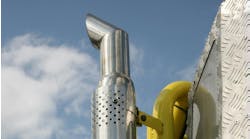Despite all the trainers, experts, and mentors in the industry, failure remains the best instructor out there. It’s why you hear successful entrepreneurs lauding the benefits of “failing fast and often.” More colloquially, we’re told to “get back on the horse” after life bucks us off into the mud. You’re supposed to clean yourself off, assess what caused the abrupt dismount, climb back up, and try a different tactic. And if you get knocked off again, repeat the process.
But why learn from your own failures when there are so many other losers out there to take the fall?
That’s the premise of one of the sector’s most intriguing innovations: predictive maintenance. After one asset fails, the fleet analytics platform learns to spot the warning signs and alerts management if they are detected. Then someone can fix the truck before it goes down on the road. But you don’t need AI to leverage this strategy in your organization. Just look around. Failure is everywhere and there’s a large enough sample size in most areas now that we don’t always need to bruise and muddy ourselves to improve. For fleets, they can study where others went wrong with new technology or equipment before adopting them, or learn from new hires what made them leave their last job.
This is specifically about managing a commercial vehicle maintenance operation, mind you. A tech might attempt to fix a fault and fail, but that’s part of the process. But organizational missteps, like not performing a quality check on an inexperienced tech’s wheel-end replacement, cannot be tolerated. A runaway trailer tire on the highway is a hell of a lot more dangerous than a bucking bronco.
The problem is sometimes we don’t know how much we’re failing. For example, the industry doesn’t accurately track wheel-off events, and fleets don’t like to share their fatal blunders. You could rely on 32-year-old data from the National Transportation Safety Board, which found between 750 and 1,050 tractor-trailer wheel separations occurred annually. But with the advent of dash cams, we can see up-close how destructive these preventable accidents can be. And those videos can be used as a training tool to make sure your shop’s techs make sure every nut is torqued correctly with a properly calibrated wrench. It might take a little more time out of the bay, but as we point out in our story on training tools, techs want more training. And there are plenty of ways to approach it, from online modules to physical training boards.
Read more: The art of using artificial intelligence in truck repair
You’ll be happy to know this issue is chock full of ways to learn from others’ failures—possibly the most since I became the magazine’s editor. Our cover story tackles ways to avoid comebacks in the shop, which even if not safety-related, kill shop and customer profitability. Hopefully, after reading it you’ll find a few new ways to improve your shop’s repair accuracy, or at least understand the need to track and learn from mistakes in the shop.
We also dive into the best ways to track repair time, which the auto repair side has down but, according to sources, isn’t as easy in the commercial sector. We do all know how important fuel efficiency and tire health are, and we cover ways to improve those areas as well. And of course, check out our annual Tool & Equipment supplement, which along with all the best practices bursting out of this issue, should put your operation on the path to success.
Of all the ideas and recommendations we’ve put forth, though, there’s really only one I want our readers to take away from this issue: strive to change your operation for the better. Whether it’s setting a new safety goal, improving repair speed and accuracy, or learning a new skill yourself, show you care about continuous improvement, that you refuse to settle for mediocrity. This will permeate into your culture and inspire others to do the same.
I’ll close with a little lesson from my previous life on a submarine. We could recite every disaster that ever happened on a sub or ship. Teachable moments about maintenance and preparedness were drilled into our heads. Even so, my boat was a mistakes magnet. We all made quite a lot in my first few years (me more than most). The culture was more toxic than ship’s sanitary tanks; morale lower than the Mariana Trench. Then, after a lot of soul-searching and training, something changed. Maybe we just got tired of losing—or maybe it was team-building degeneracy in European ports. But we ended up (dare I say perfectly) executing our mission in [REDACTED]. We won the Battle “E” (Efficiency) Award and were recognized as the most improved ship in the Atlantic fleet.
It was a painful crucible to live through, but could we have achieved so much without the experience? Hard to say for sure, but I doubt it.
This is why we can’t always use other’s failures to power our own victories, and why leaders can’t always step in when employees are about to fail. With safety stuff, absolutely—though you should also explain where they went wrong and how to never repeat it. But for the day-to-day stuff, like troubleshooting a new issue or even interacting with an angry customer, even if it takes longer to fix a truck or you lose one client, let them figure it out. This shows them they don’t always have to strive for perfection (the pursuit of which can incite mistakes), and that you have their back. And that’s the stuff of a winning team.




